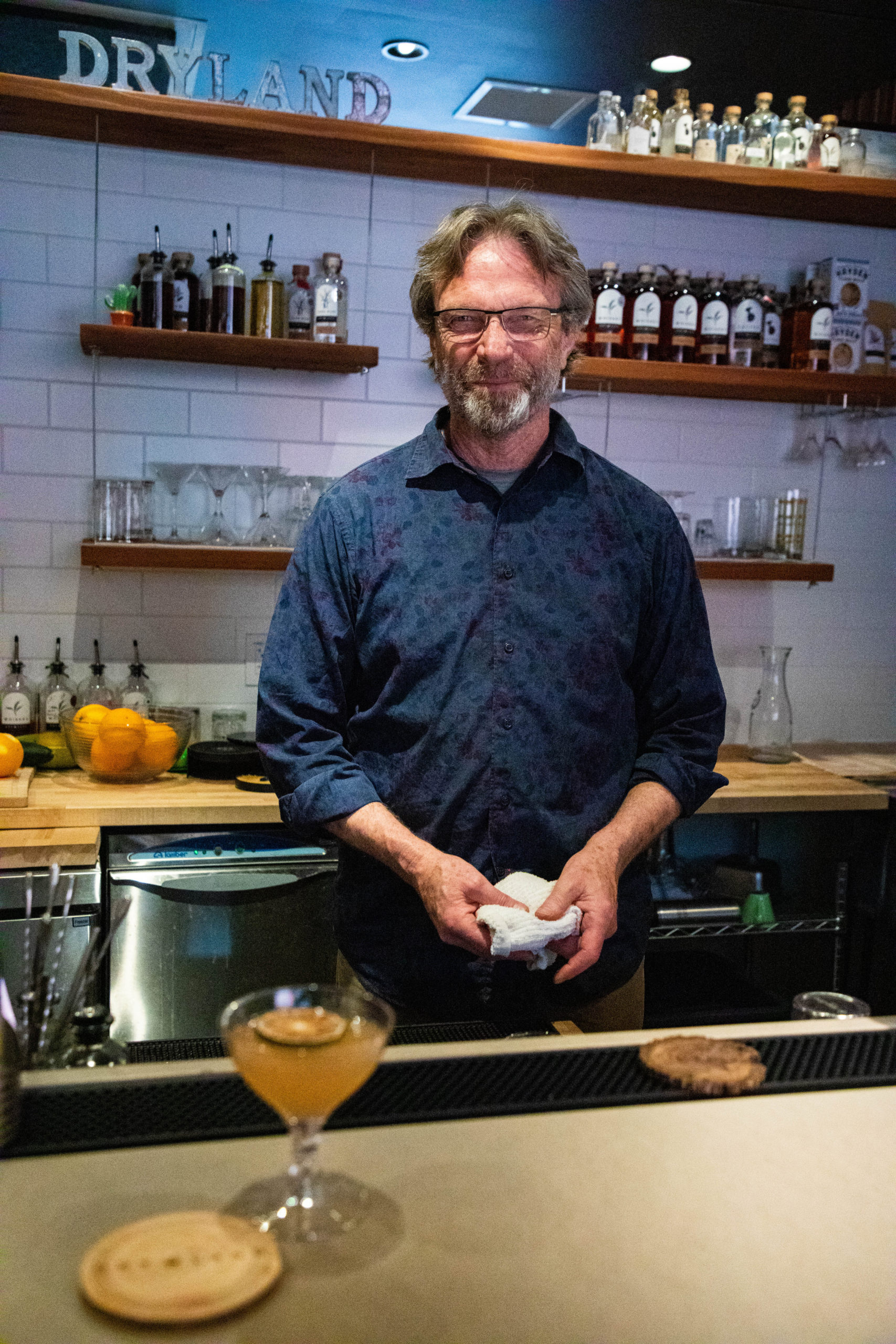
A negroni, that simple classic of gin, vermouth and amaro, is still a negroni if you swap out the gin (though sometimes you add whiskey and it becomes a boulevardier). But what if you swap out the gin for a smokey cactus spirit and replace the other liqueurs with something scratch-made?
You get Dry Land Distiller’s cactus negroni, with complex layers of herbs, smoke and fruit balanced against a hint of oak—you get something uniquely delicious and difficult to replicate.
Known for a dedication to Colorado ingredients like heirloom white wheat in its whiskey and native botanicals in its uniquely floral gin, Longmont’s Dry Land Distillers holds up the “craft” in “craft distilling” in its tasting room as well. Dry Land’s bar manager, Glen Carmichael, along with his talented staff, make sure that care and thought are put into each cocktail component—even if it means making it all from scratch.
Distilleries face a unique restriction in running a tasting room bar, in that they may only sell alcoholic beverages that have been produced on-site. Practically speaking, that means finding substitutes for things like amaro and vermouth instead of ordering bottles from a distributor, or making a stop at the liquor store before the bar opens.
The restriction has become an opportunity for Dry Land, Carmichael says, allowing the distillery to refine each recipe for balance and to highlight the small-batch spirits within.

“It is nice to be able to say we make it in house. It adds a little more uniqueness and makes for a nice talking point,” he explains.
Carmichael has blends of seasonal amaros—botanical liqueurs—with varying ingredients, as well as less-common offerings like the ginger, lime and rum syrup liqueur called falernum, ready to mix and serve in the Main Street tasting room. The recipes aren’t restricted to just alcohol though, as Carmichael has created pecan orgeat, botanical shrubs and house bitters to supplement the ever-growing cocktail menu.
The motivation, he explains, is balance.
“This way we don’t have to adjust a recipe based on somebody else’s sweetener. That’s important to us. Instead of changing our spirits or changing the amount of our spirit, we find something that works. And we enjoy it,” Carmichael says.
Earlier this year, Dry Land was awarded the Snail of Approval award from Slow Food USA, given in recognition for excellence in environmentally sustainable sourcing, impact and business values, among other traits. The commitment to minimizing waste is evidenced in the ingredients created in the tasting room. Even the fruit and herb mascerations used to make shrubs are repurposed, Carmichael says, turned into a spread for crackers in the tasting room. Citrus peels either get turned into dehydrated snacks or garnishes as well.
“There’s nothing lost at all. It’s important to us that we follow these (sustainability) guidelines, but it’s rewarding as well,” he says. “Besides making everything from start to finish, knowing that we properly finish out with the product.”
Patience also has a reward in strange fruits. A couple years back, when bringing in the mesquite-smoked cactus pads Dry Land uses to distill its cactus spirit, they also acquired the fruit of the cactus. After mashing and distilling, the results didn’t flower into something palatable until two years in a barrel, Carmichael explains.
That aged cactus fruit spirit has a small batch but a strong presence, particularly in the Golden Cactus cocktail. Featuring the fruit spirit, house-made falernum, bitters and a splash of simple syrup, “Golden Cactus” is both tart and floral, an easy-drinking cocktail that seems to relish the onset of spring.
Dry Land’s cocktail menu is always shifting, with a focus on seasonal ingredients grown as close to home as possible. The “Golden Cactus” may not be on the specials board for long, but whatever replaces it will surely be worth a stop by the bar. Carmichael and his staff are always on-hand to indulge in any curiosities visitors might have.














